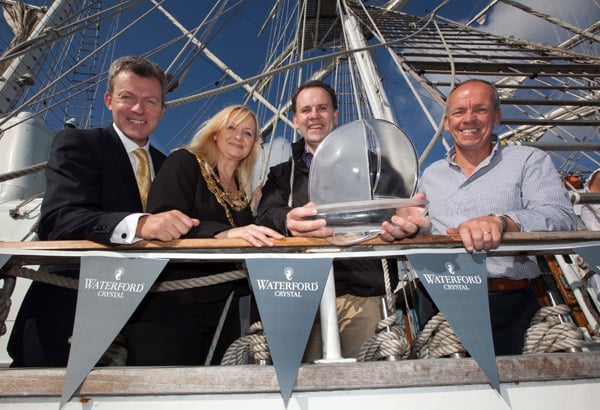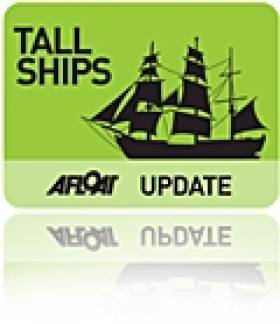Displaying items by tag: Cllr Mary Roche
Setting Sails for Waterford's Tall Ships Race
The four-day maritime spectacle expects to attract 500,000 visitors to throng the quays of the 'Crystal' city. Presented by Szczecin and organised by Sail Training International, the prestigious event is supported through host-port partners, 3, Bulmers Original Irish Cider and Waterford Crystal. In addition the host-port educational partner is Waterford Institute of Technology and the official media partner covering the event is RTE. Between them over €450,000 has been raised to support funding.
Waterford City Council and the Port of Waterford are providing leading roles as delivering agencies having jointly mounted the bid to secure staging the Tall Ships Races return following the city's successful hosting of the event in 2005.
Notably in that year's 'Parade of Sail' the procession was led by Asgard II, followed astern by Jeanie Johnston and Dunbrody. The involvement of all Irish tall-ships was an historical occasion particularly in view of the sinking of Asgard II three years later.
In 2005, Waterford also claimed to be the first Irish host port to be the starting port for the race and this will be repeated in 2011.

Gary Breen, Failte Ireland; Cllr Mary Roche,Mayor of Waterford,David McCoy, House of Waterford Crystal and Des Whelan, Chairman, The Tall Ships Races 2011 onboard the 'Lord Nelson' in Waterford. Photo: Dylan Vaughan
At the reception onboard Lord Nelson, Cllr Mary Roche, Mayor of Waterford said: "To 3,Bulmers,RTE, Waterford Crystal and Waterford Institute of Technology, I say a very sincere thank you on behalf of the people of Waterford and all of those around Europe and beyond who will be here next summer for what promises to be four magical days of free fun in Ireland's oldest city".
Next year's hosting is also to be supported by Failte Ireland which is allocating resources of €3m while Tourism Ireland will embark on an intensive marketing campaign during the mid summer event, which is billed to be the biggest event in Ireland.
There will be between 80-100 tall-ships and their international crews converging in Waterford. Among the vessels confirmed is the 1937-built, Christian Radich which starred in the 1958 film, The Windjammer and also featured in the 1970's television series, The Onedin Line.
Incidentally the Christian Radich was used, albeit with limited trainee spaces allocated to Coist an Asgard in an arrangement with the vessel's Norwegian owners in 2009, the first full year of the national sail training programme since the sinking of Asgard II the previous year.
The staging costs of the 2011 Tall Ships is estimated at €3.5m and is expected to generate €35m to Waterford City and hinterland. The organisers of the event will be embracing social technology communications networks with presentations on Facebook, Twitter and other servers.
Last year Belfast held the honour in welcoming the finale of the Tall Ship Races, incorporating the Tall Ships Atlantic Challenge. Dublin hosted the event in 1998, albeit the race was then known as the Cutty Sark Tall Ships Race with this same title applying to the race when the event visited Cork Harbour in 1991.
Looking for further reading on Tall Ships in Ireland? Click the links below:
Click this link to read all our Tall Ships Stories on one handy page
Previewing Ireland's Tall Ships 2011 Season
Can Ireland Get a New Tall Ship?
























































